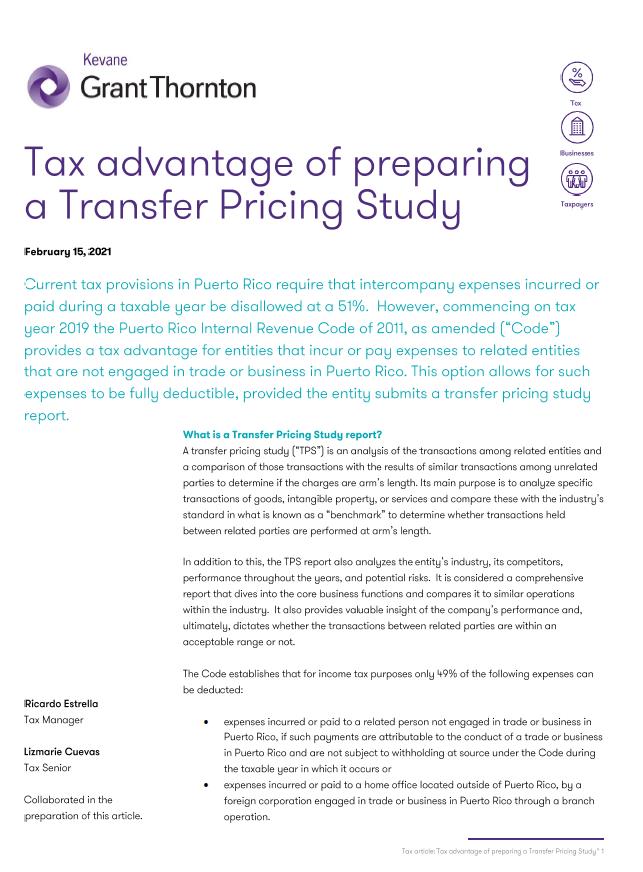-
Financial statements audits
Financial statement audits
-
Compliance audits
Compliance audits
-
Compilations and reviews
Compilations and audit
-
Agreed-upon procedures
Agreed-upon procedures
-
Corporate and business tax
Our trusted teams can prepare corporate tax files and ruling requests, support you with deferrals, accounting procedures and legitimate tax benefits.
-
International tax
Our teams have in-depth knowledge of the relationship between domestic and international tax laws.
-
Tax compliance
Business Tax
-
Individual taxes
Individual taxes
-
Estate and succession planning
Estate and succession planning
-
Global mobility services
Through our global organisation of member firms, we support both companies and individuals, providing insightful solutions to minimise the tax burden for both parties.
-
Sales and use tax and indirect taxes
SUT/ VAT & indirect taxes
-
Tax incentives program
Tax incentives program
-
Transfer Pricing Study
The laws surrounding transfer pricing are becoming ever more complex, as tax affairs of multinational companies are facing scrutiny from media, regulators and the public
-
Business consulting
Our business consulting services can help you improve your operational performance and productivity, adding value throughout your growth life cycle.
-
Forensic and investigative services
At Grant Thornton, we have a wealth of knowledge in forensic services and can support you with issues such as dispute resolution, fraud and insurance claims.
-
Fraud and investigations
The commercial landscape is changing fast. An ever more regulated environment means organizations today must adopt stringent governance and compliance processes. As business has become global, organizations need to adapt to deal with multi-jurisdictional investigations, litigation, and dispute resolution, address the threat of cyber-attack and at the same time protect the organization’s value.
-
Dispute resolutions
Our independent experts are experienced in advising on civil and criminal matters involving contract breaches, partnership disputes, auditor negligence, shareholder disputes and company valuations, disputes for corporates, the public sector and individuals. We act in all forms of dispute resolution, including litigation, arbitration, and mediation.
-
Business risk services
We can help you identify, understand and manage potential risks to safeguard your business and comply with regulatory requirements.
-
Internal audit
We work with our clients to assess their corporate level risk, identify areas of greatest risk and develop appropriate work plans and audit programs to mitigate these risks.
-
Service organization reports
As a service organization, you know how important it is to produce a report for your customers and their auditors that instills confidence and enhances their trust in your services. Grant Thornton Advisory professionals can help you determine which report(s) will satisfy your customers’ needs and provide relevant information to your customers and customers’ auditors that will be a business benefit to you.
-
Transaction advisory services
Transactions are significant events in the life of a business – a successful deal that can have a lasting impact on the future shape of the organizations involved. Because the stakes are high for both buyers and sellers, experience, determination and pragmatism are required to bring deals safely through to conclusion.
-
Mergers and acquisitions
Globalization and company growth ambitions are driving an increase in M&A activity worldwide as businesses look to establish a footprint in countries beyond their own. Even within their own regions, many businesses feel the pressure to acquire in order to establish a strategic presence in new markets, such as those being created by rapid technological innovation.
-
Valuations
We can support you throughout the transaction process – helping achieve the best possible outcome at the point of the transaction and in the longer term.
-
Recovery and reorganization
We provide a wide range of services to recovery and reorganisation professionals, companies and their stakeholders.
What is a Transfer Pricing Study report?
A transfer pricing study (“TPS”) is an analysis of the transactions among related entities and a comparison of those transactions with the results of similar transactions among unrelated parties to determine if the charges are arm’s length. Its main purpose is to analyze specific transactions of goods, intangible property, or services and compare these with the industry’s standard in what is known as a “benchmark” to determine whether transactions held between related parties are performed at arm’s length.
In addition to this, the TPS report also analyzes the entity’s industry, its competitors, performance throughout the years, and potential risks. It is considered a comprehensive report that dives into the core business functions and compares it to similar operations within the industry. It also provides valuable insight of the company’s performance and, ultimately, dictates whether the transactions between related parties are within an acceptable range or not.
The Code establishes that for income tax purposes only 49% of the following expenses can be deducted:
- expenses incurred or paid to a related person not engaged in trade or business in Puerto Rico, if such payments are attributable to the conduct of a trade or business in Puerto Rico and are not subject to withholding at source under the Code during the taxable year in which it occurs or
- expenses incurred or paid to a home office located outside of Puerto Rico, by a foreign corporation engaged in trade or business in Puerto Rico through a branch operation.
Taxpayers subject to the limitation explained above, have the option to claim 100% of intercompany expenses if a Transfer Pricing Study is performed following the United States transfer pricing rules established in Section 482 of the US Internal Revenue Code and its regulations thereunder. This TPS must be submitted along with the filing of the income tax return in order for taxpayers to be entitled to claim 100% of the expenses described above.

